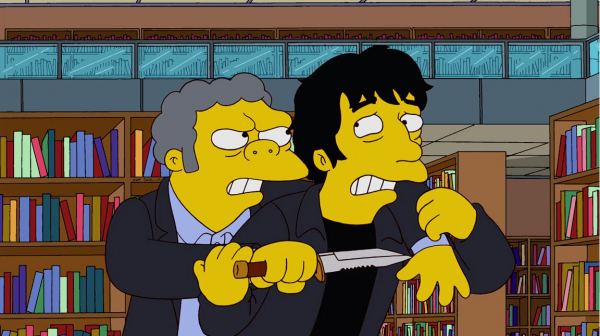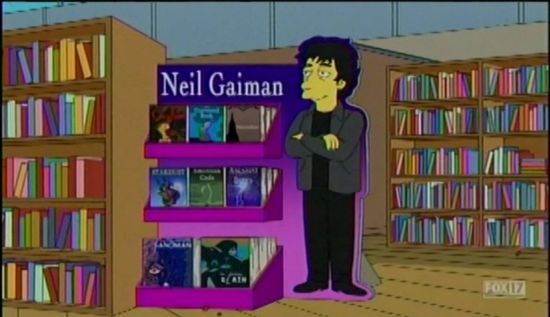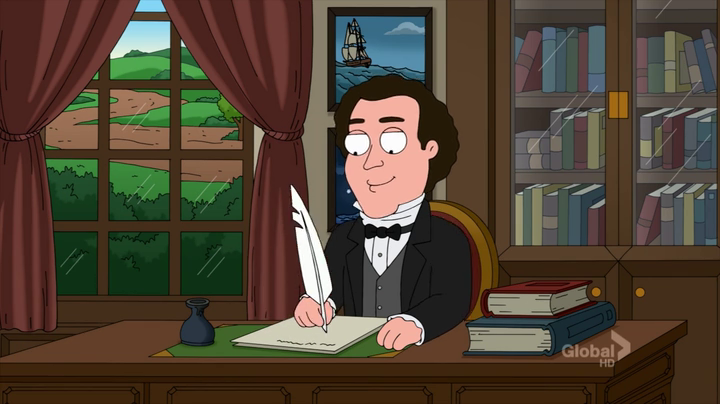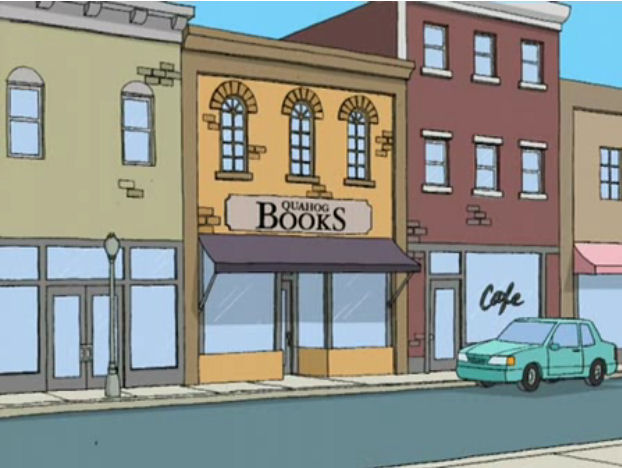Neil Gaiman on The Simpsons, tween lit lovers rejoice and/or get depressed
(part of my ongoing Unexpected Literary References series)

Yesterday (11-20-2011) The Simpsons continued its legacy of literary references with an episode featuring Neil Gaiman, author of American Gods, Anansi Boys, and many others . The episode, “The Book Job” (season 23, episode 6), explores the culture of tween lit, specifically stories featuring vampires and magicians, using an Ocean’s Eleven-style heist as the plot backdrop. Though the episode speaks primarily to the idea that tween lit may be hugely factory produced for market consumption rather than intellectual stimulation, the optimistic take-away is that even in a world where television and the internet dominate as means of entertainment and information distribution, books seem to be making a resurgence. This, my hope anyway, will seed these tween literateurs with a life-long love of reading.
About “The Book Job“:
Lisa becomes disheartened when she learns the shocking truth behind the “tween lit” industry and her beloved fantasy novel characters, but Homer decides to cash in on the craze and forms a team to group-write the next “tween lit” hit, with the king of fantasy, Neil Gaiman, lending his expertise to the effort. After catching the eye of a slick industry publisher at the Springfield Book Fair, the team gets an advanced copy of their work and discovers that the corporate lit business is a bigger operation than they imagined.




Just gonna bug you, Caleb, cause I haven’t in awhile–but why are these not just “literary reference”–why are they “unexpected”? Especially in the programs you tend to feature (especially in the Looney Toons!–not to mention Hannah and Barbara stuff, not that you’ve mention that, yet) it is actually quite expected and part of the draw of the programs. The Simpsons, for example, why that sort of thing has been the programs bread and butter for more than a decade now, it would be more unexpected for such things not to be there (references to Gore Vidal’s “Burr” in the form of a joke about Eskimo Pies being one of my favorite) I mean The Simpson’s has spoofed McGoohan’s The Prisoner (TV, I know, but ultra literary TV) on multiple occasions and in such spot on, inside ways that I think whole slates of people STILL don’t get half the jokes and the salesman character Gil is a recurring reference to Glengarry’s Shelly “the Machine” Levine etc. etc.–Family Guy et al. picking up from it and the whole Adult Swim (going back to Space Ghost Coast to Coast) revels in such things, the more understated the better, like they TRY to sneak the best jokes past .
Hhaha, but I’m not trying to contradict or argue with anything, so let me end before I nerd on into a rant–but don’t you think the presence of literary reference in such generally popular (albeit the upper crust of the generally popular) programs speaks more to the fact that literary references, in general, are not unexpected at all–i think you come off as a little bit jaded, using that word, you dig? 🙂 i mean, people DO read and, contrary to what your title to the series suggests, audiences of programs you cull these references from are a fairly learned lot–it wasn’t the dolts who demanded Futurerama come back, you know? it isn’t the lowest common denominator that kept Family Guy off the scrap heap so many times.
THERE, you have been officially bugged. Bwahaha. If you reply, give me a day or two to get back, I will be computerless for a few days, just wanted to stick my nose in your harmless business one more time before blacking out.
I wanted to play off of “Great Expectations” but didn’t want to call it “Great Expected Literary References.” That’s the simple response.
Too, I think a lot of the references I call out are unexpected, at least in terms of general assumptions of what cartoons are/should be. A lot of people still think cartoons are only for children (and therefore, literary references would not be acknowledged). Yes, it is the learned who keep shows like Futurama and Family Guy on the air, but I still maintain that many book references go over the heads of most cartoon watchers.
I think the bigger bug would be to argue my loose use of the word “literary” (rather than “unexpected”). Most of the references (Stephen King, that Hunt for Red October book) are culled from popular conscious. I rarely catch a cartoon referencing something more intellectually stimulating (though it is done). Yes, people read quite a bit. But they read what most would probably not call “literary” fiction, I would argue.
Yet, I couldn’t simply call the series “Great Unexpected Book” references. What would be a valid substitute for “literary” in this case?
Great points, sir, I am more or less bested–full response in a day or two, but touche for now–though remember, the Simpsons without even calling it out,did reference Georges Perec’s “a void” in the episode where Homer becomes a food critic. they get mad props for that. i imagine it’s one of your favorite books, too, so you may have mentioned it before and i just didn’t notice it.
again…becoming computerless.
sigh
Actually, I’ve never read it, but I feel like I need to now. Thanks for once again stretching my to-read list, sir.
EDIT: Wow, this book sounds amazing. It’s been wishlisted. Fingers crossed Santa is good to me this year. The book sounds a bit like Mark Dunn’s Ella Minnow Pea. Are you familiar? It’s a damn good book, with just the right amount of clever to be fun.
[…] the wonderful Pablo D’Stair recently called me out on the possible inaccuracy of calling this series “unexpected” literary references, I’m too far in to change the name (re: too lazy to change the name). And this latest find, […]
[…] what makes this blog post worthy is a comment on a recent-ish blog post (about Neil Gaiman’s appearance on The Simpsons): “why are they ‘unexpected’? Especially in […]